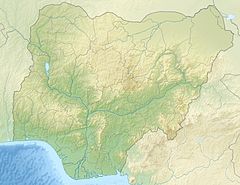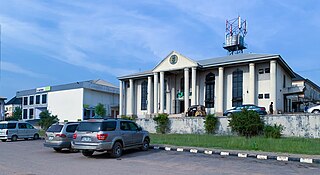
Onitsha is a city on the eastern bank of the Niger River, in Anambra State, Nigeria. A metropolitan city, Onitsha is known for its river port and as an economic hub for commerce, industry, and education. It is one of the largest metropolitan area in Nigeria with a fast growing population of over 8 million people. It hosts the Onitsha Main Market, the largest market in Africa in terms of geographical size and volume of goods. Onitsha and neighboring Asaba on the western bank of the Niger River form a continuous metropolitan area.
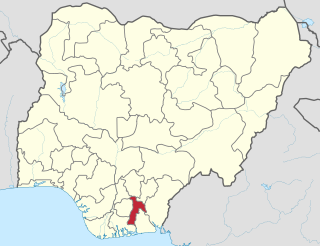
Abia State is a state in the South-East geopolitical zone of Nigeria, it is bordered to the northwest by Anambra State and northeast by the states of Enugu, and Ebonyi, Imo State to the west, Cross River State to the east, Akwa Ibom State to the southeast, and Rivers State to the south. Abia is the only Southeastern state that has boundaries with the other four Southeastern states in Nigeria. It takes its name from the acronym for four of the state's most populated regions: Aba, Bende, Isuikwuato, and Afikpo. The state capital is Umuahia while the largest city and commercial centre is Aba.

Benue River, previously known as the Chadda River or Tchadda, is the major tributary of the Niger River, with a length of approximately 1,400 kilometres (870 mi) long and almost entirely navigable during the summer months. The size of its catchment basin is 319,000 km2 (123,000 sq mi). As a result, it is an important transportation route in the regions through which it flows. The name Benue comes from Binuwe meaning 'Mother of Waters’ in the Batta language.

Aba is a city in the southeast of Nigeria and the commercial centre of Abia State. Upon the creation of Abia State in 1991, Aba was divided into two local government areas: Aba South and Aba North. Aba South is the main city centre of Abia State, located in south-east Nigeria. It is located on the Aba River. Aba is made up of many villages such as Aba-Ukwu, Eziukwu-Aba, Obuda-Aba, Umuokpoji-Aba and other villages that have been merged for administrative convenience. Aba was established by the Ngwa clan of the Igbo people in Nigeria as a market town. Later, a military post was placed there by the British colonial administration in 1901. It lies along the west bank of the Aba River and is at the intersection of roads leading to Port Harcourt, Owerri, Umuahia, Ikot Ekpene, and Ikot-Abasi. The city became a collection point for agricultural products following construction of a British-made railway running through it to Port Harcourt. Aba is a major urban settlement and commercial centre in its region, which is surrounded by small villages and towns. The indigenous people of Aba are the Ngwa. Aba is well known for its craftsmen and also the most populous city in the Southeastern Nigeria. As of 2016, Aba had an estimated population of 2,534,265. The state's slogan is "God's Own State".

Georgetown is a neighborhood in Seattle, Washington, United States. It is bounded on the north by the mainlines of the BNSF Railway and Union Pacific Railroad, beyond which is the Industrial District; on the west by the Duwamish River, across which is South Park; on the east by Interstate 5, beyond which is Beacon Hill; and on the south by Boeing Field.

The Motagua River is a 486-kilometre-long (302 mi) river in Guatemala. It rises in the Western Highlands of Guatemala and runs in an easterly direction to the Gulf of Honduras. The Motagua River basin covers an area of 12,670 square kilometres (4,890 sq mi) and is the largest in Guatemala.
The Aba Women's Riots of 1929 was a period of unrest in colonial Nigeria over November 1929. The protests broke out when thousands of Igbo women from the Bende District, Umuahia and other places in southeastern Nigeria traveled to the town of Oloko to protest against the Warrant Chiefs, whom they accused of restricting the role of women in the government. The protest encompassed women from six ethnic groups.
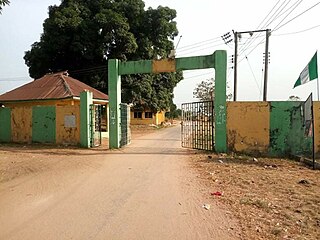
Oguta is a town on the east bank of Oguta Lake in Imo State of southeastern Nigeria.

Shell Nigeria is the common name for Shell plc's Nigerian operations carried out through four subsidiaries—primarily Shell Petroleum Development Company of Nigeria Limited (SPDC). Royal Dutch Shell's joint ventures account for more than 21% of Nigeria's total petroleum production.
Environmental issues in the Niger Delta are caused by its petroleum industry. The delta covers 20,000 km2 (7,700 sq mi) within wetlands of 70,000 km2 (27,000 sq mi) formed primarily by sediment deposition. Home to 20 million people and 40 different ethnic groups, this floodplain makes up 7.5% of Nigeria's total land mass. It is the largest wetland and maintains the third-largest drainage basin in Africa. The Delta's environment can be broken down into four ecological zones: coastal barrier islands, mangrove swamp forests, freshwater swamps, and lowland rainforests. Fishing and farming are the main sources of livelihoods for majority of her residents.
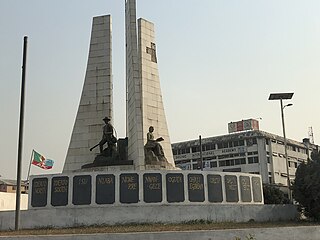
Imo State is a state in the South-East geopolitical zone of Nigeria, bordered to the north by Anambra State, Rivers State to the west and south, and Abia State to the east. It takes its name from the Imo River which flows along the state's eastern border. The state capital is Owerri and the state nickname is the "Eastern Heartland."
Nkechi Justina Nwaogu, is a Nigerian politician and banker, founder and CEO Libra Investment. She is the former Chairman Governing Council and Pro Chancellor University of Calabar. Nwaogu was the Member representing Osisioma Ngwa, Ugwunagbo and Obi Ngwa Federal Constituency in the Federal House of Representatives from 2003 to 2007. In 2007 she was elected as the Senator representing Abia Central Senatorial District. In 2011 she was re-elected for a second tenure in office.

The Otamiri River is one of the main rivers in Imo State, Nigeria. The river takes its name from Ota Miri, a deity who owns all the waters that are called by his name, and who is often the dominating god of Mbari houses. The river runs south from Egbu past Owerri and through Nekede, Ihiagwa, Eziobodo, Olokwu Umuisi, Mgbirichi and Umuagwo to Ozuzu in Etche, in the Rivers State, from where it flows to the Atlantic Ocean. The length of the river from its source to its confluence at Emeabiam with the Uramiriukwa River is 30 kilometres (19 mi).
Isiala-Ngwa North is a Local Government Area of Abia State, Nigeria. Its headquarters is Okpuala-Ngwa.
Osisioma Ngwa is a Local Government Area of Abia state of Nigeria. Its headquarters are located in Osisioma town.
The Ngwa people are an Igbo group living in the southern part of Igboland. The Ngwa people are found predominantly in Abia State with a population of 314,840 in 1963. They cover 1,328 square kilometres (513 sq mi) and are the largest subgroup of Igbo people.

The Imo River (Igbo:Imo) is located in southeastern Nigeria and flows 240 kilometres (150 mi) into the Atlantic Ocean. In Akwa Ibom State, the river is known as Imoh River, that is, Inyang Imoh, which translates to River of Wealth. Its estuary is around 40 kilometres (25 mi) wide, and the river has an annual discharge of 4 cubic kilometres (1.0 cu mi) with 26,000 hectares of wetland. The Imo's tributary rivers are the Otamiri and Oramirukwa. The Imo was cleared under the British colonial administration of Nigeria in 1907–1908 and 1911; first to Aba and then to Udo near Umuahia.

Responsibility of water supply in Nigeria is shared between three (3) levels of government – federal, state and local. The federal government is in charge of water resources management; state governments have the primary responsibility for urban water supply; and local governments together with communities are responsible for rural water supply. The responsibility for sanitation is not clearly defined.
Alex Otti is a Nigerian economist, banker, investor, philanthropist, and politician, serving as the current Governor of Abia State in Nigeria. He is from Isiala-ngwa. Otti is the former Group Managing Director of Diamond Bank Plc, a retail financial institution in Nigeria. Otti was a gubernatorial candidate of Abia State on the platform of All Progressives Grand Alliance (APGA). On 31 December 2015, The Court of Appeal which sat in Owerri removed Okezie Ikpeazu of the Peoples Democratic Party as governor of Abia State and declared Otti the winner of the April 11 and April 25 Governorship elections in the state. On February 3, 2016, the Supreme Court of Nigeria reversed the verdict of the Court of Appeal and affirmed the election of Ikpeazu as Governor. Otti is a member of the editorial board of Thisday, and writes a fortnightly column, every other Monday, titled "Outside The Box".

Awo-Omamma, in the Northeast of Niger Delta basin is an oil-rich indigenous Igbo town on the banks of Njaba River. It is a potential tourism hub in the region due to its species of wildlife in Umuezukwe and green vegetation.

